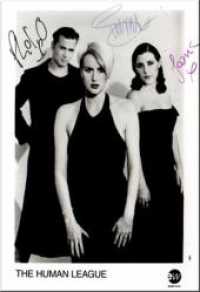Human League began in the late 1970s as the brainchild of two computer operators, Ian Craig Marsh and Martyn Ware, from Sheffield, England. They tried a number of names including the Dead Daughters and the Future until settling upon the Human League after former hospital porter, Philip Oakey, joined the group. Adrian Wright joined shortly thereafter to prepare slide shows for projection during the group's live performances. The first single, Being Boiled, was released in 1978, but the group did not make the charts in the UK until the release of Holiday 80 in the spring of 1980. As a result the Human League's second album Travelogue made the UK Top 20.
By 1980 the Human League began to feel strain between the pop music favored by Philip Oakey and Adrian Wright and the more austere electronic sounds favored by Ian Craig Marsh and Martyn Ware. In October 1980 the group split in half. Ware and Marsh left to begin a project called the British Electric Foundation whose first spinoff was the group Heaven 17 and their hit (We Don't Need This) Fascist Groove Thang. Of the remaining Human League pair, only Philip Oakey was a performer. With determination to complete a European tour, Adrian Wright began learning to play synthesizer and two female singers, Susan Ann Sulley and Joanne Catherall, were recruited from among the dancers at Sheffield's Crazy Daisy disco. Bassist Ian Burden was also added as a temporary group member.
Early in 1981 the new Human League hooked up with producer Martin Rushent in what would be a very fortuitous endeavor for each. By July the League had broken into the UK top 5 with the single Love Action (I Believe in Love). Ian Burden became a permanent member and synthesizer player Jo Callis was recruited from the group the Rezillos. This lineup completed the Human League's third album, its breakthrough and masterpiece Dare by the fall of 1981. The new single from the album was Don't You Want Me?. It quickly reached #1 in the UK and became a pop and dance smash in the U.S. in early 1982. The Human League's all-synthesizer sound revolutionized 1980s pop music.
By the mid-1980's "synthpop" was difficult to avoid. Late in 1982 the group and Martin Rushent released a primarily instrumental album containing remixes of many of the songs on Dare. Along with Soft Cell's Non Stop Ecstatic Dancing it was one of the first albums of material remixed specifically for dance clubs. The artist name used for the album, League Unlimited Orchestra, was a play on Barry White's Love Unlimited Orchestra, widely credited for recording the first disco songs.
The Human League had a difficult time putting together an album to follow Dare. Their singles success continued with the catchy Mirror Man and (Keep Feeling) Fascination in 1983. Finally Hysteria appeared in May of 1984. The album was a success worldwide, but the League began to lose their following in the U.S. The Lebanon was the leadoff single.
Crash Another long period with no new Human League material ensued in the mid-1980s. Philip Oakey worked with master producer Giorgio Moroder, singing on the soundtrack to the computer love story film Electric Dreams. As the Human League returned to the studio, recording became a long, drawn-out affair with multiple studios and multiple producers. The new album Crash was finally completed with R&B star producers Jimmy Jam and Terry Lewis. Released in the fall of 1986, Crash featured an elegant pop sound. The lead single Human was a massive worldwide success. It was their biggest hit since Don't You Want Me? and brought the Human League their second #1 hit in America.
Unfortunately, the new success was short-lived. It took the Human League another four years to release their 6th full length album in 13 years. Romantic?, released in 1990, sounded dated. The synthpop revolution had passed. The League began to fade into obscurity. In 1995 another new album Octopus was released. The League's music showed some renewed energy but commercial success did not return. Amid rumours of new recordings, the Human League hit the road on tour with ABC and Culture Club in late 1998.
